Hospitality Consumer Behaviour and Insight: Unit 19 Report Analysis
VerifiedAdded on 2023/01/06
|13
|2767
|73
Report
AI Summary
This report provides a comprehensive analysis of consumer behavior within the hospitality sector, using Four Seasons Hotels and Resorts as a case study. It delves into factors influencing consumer behavior, the impact of digital technology, and the stages of consumer decision-making, including need recognition, information search, evaluation of alternatives, purchase, and post-purchase evaluation. The report compares B2B and B2C decision-making processes, explores various market research approaches, and examines how marketers influence consumer choices. Key aspects include the importance of consumer mapping, the significance of understanding consumer behavior for ROI, and the influence of marketers on each stage of the decision-making process, ultimately highlighting strategies for attracting and retaining customers in the competitive hospitality market. The report emphasizes the importance of customer-centric approaches and providing high-quality services to gain a competitive edge.
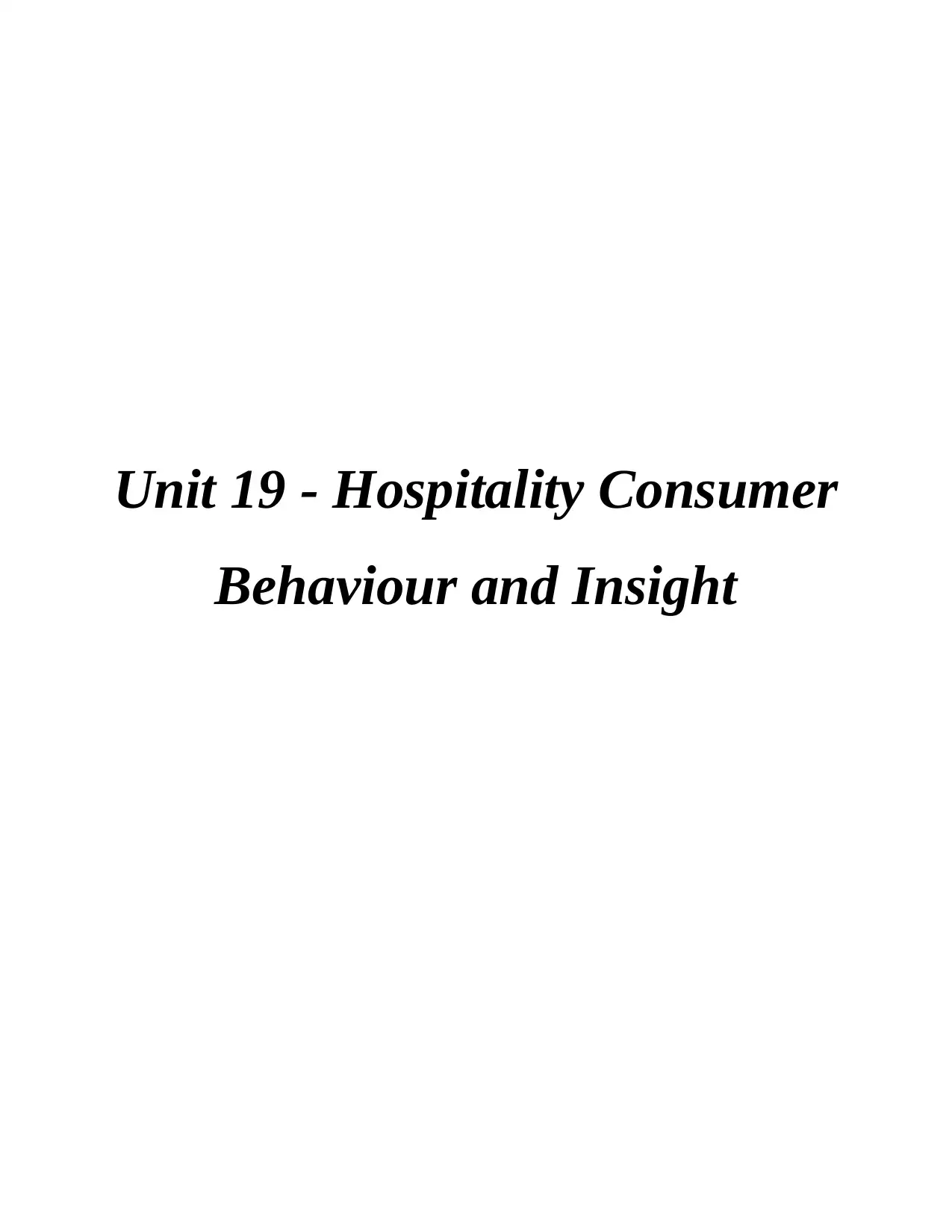
Unit 19 - Hospitality Consumer
Behaviour and Insight
Behaviour and Insight
Paraphrase This Document
Need a fresh take? Get an instant paraphrase of this document with our AI Paraphraser
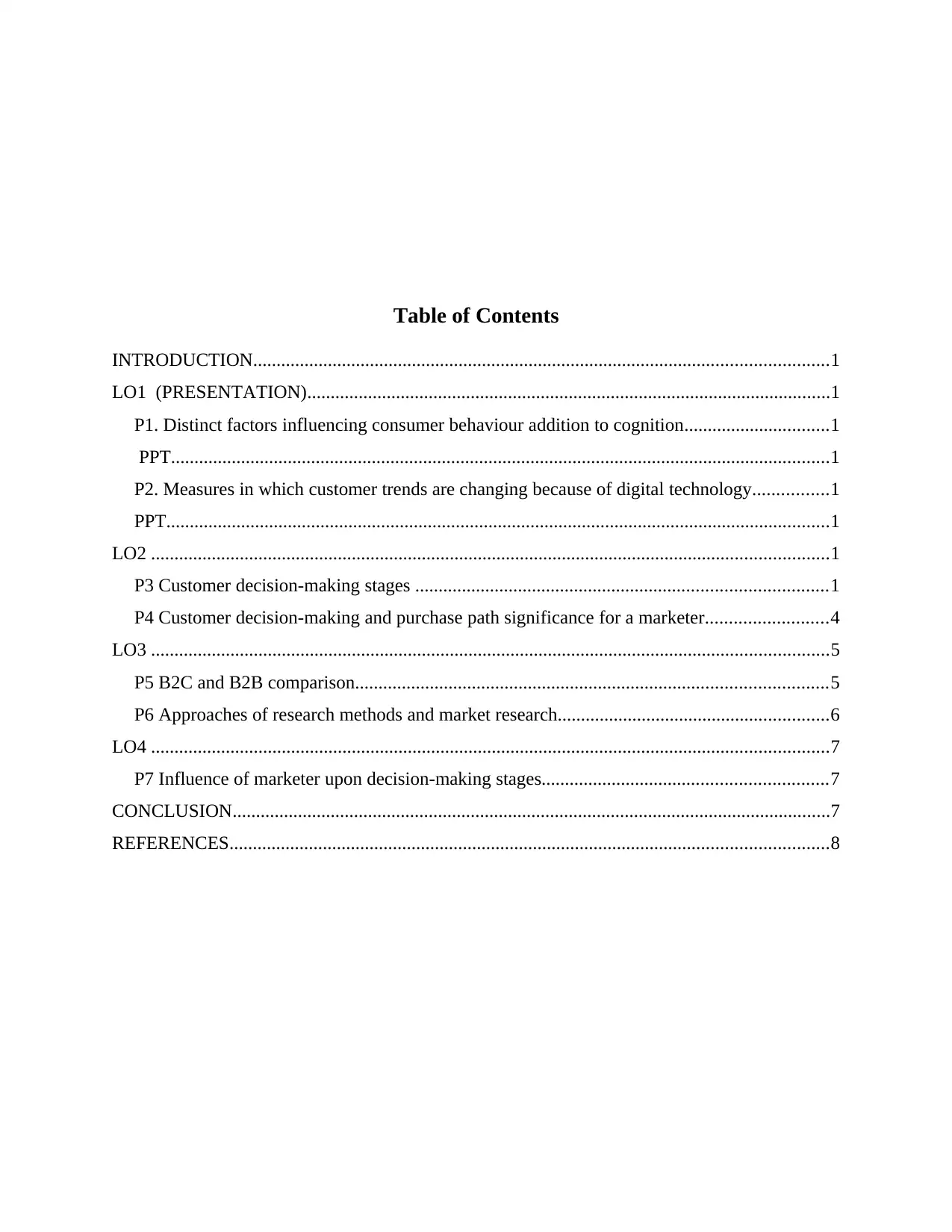
Table of Contents
INTRODUCTION...........................................................................................................................1
LO1 (PRESENTATION)................................................................................................................1
P1. Distinct factors influencing consumer behaviour addition to cognition...............................1
PPT.............................................................................................................................................1
P2. Measures in which customer trends are changing because of digital technology................1
PPT..............................................................................................................................................1
LO2 .................................................................................................................................................1
P3 Customer decision-making stages ........................................................................................1
P4 Customer decision-making and purchase path significance for a marketer..........................4
LO3 .................................................................................................................................................5
P5 B2C and B2B comparison.....................................................................................................5
P6 Approaches of research methods and market research..........................................................6
LO4 .................................................................................................................................................7
P7 Influence of marketer upon decision-making stages.............................................................7
CONCLUSION................................................................................................................................7
REFERENCES................................................................................................................................8
INTRODUCTION...........................................................................................................................1
LO1 (PRESENTATION)................................................................................................................1
P1. Distinct factors influencing consumer behaviour addition to cognition...............................1
PPT.............................................................................................................................................1
P2. Measures in which customer trends are changing because of digital technology................1
PPT..............................................................................................................................................1
LO2 .................................................................................................................................................1
P3 Customer decision-making stages ........................................................................................1
P4 Customer decision-making and purchase path significance for a marketer..........................4
LO3 .................................................................................................................................................5
P5 B2C and B2B comparison.....................................................................................................5
P6 Approaches of research methods and market research..........................................................6
LO4 .................................................................................................................................................7
P7 Influence of marketer upon decision-making stages.............................................................7
CONCLUSION................................................................................................................................7
REFERENCES................................................................................................................................8

⊘ This is a preview!⊘
Do you want full access?
Subscribe today to unlock all pages.

Trusted by 1+ million students worldwide
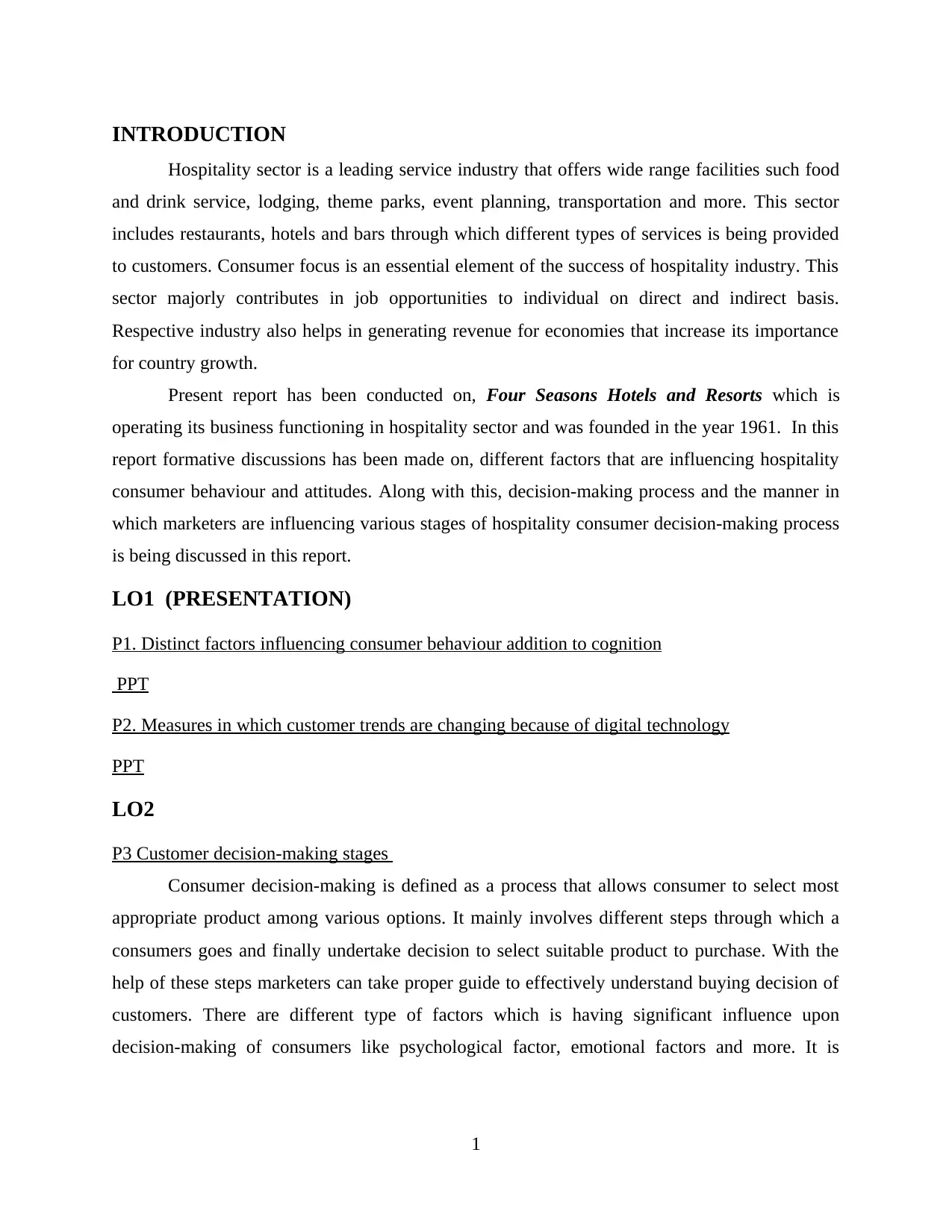
INTRODUCTION
Hospitality sector is a leading service industry that offers wide range facilities such food
and drink service, lodging, theme parks, event planning, transportation and more. This sector
includes restaurants, hotels and bars through which different types of services is being provided
to customers. Consumer focus is an essential element of the success of hospitality industry. This
sector majorly contributes in job opportunities to individual on direct and indirect basis.
Respective industry also helps in generating revenue for economies that increase its importance
for country growth.
Present report has been conducted on, Four Seasons Hotels and Resorts which is
operating its business functioning in hospitality sector and was founded in the year 1961. In this
report formative discussions has been made on, different factors that are influencing hospitality
consumer behaviour and attitudes. Along with this, decision-making process and the manner in
which marketers are influencing various stages of hospitality consumer decision-making process
is being discussed in this report.
LO1 (PRESENTATION)
P1. Distinct factors influencing consumer behaviour addition to cognition
PPT
P2. Measures in which customer trends are changing because of digital technology
PPT
LO2
P3 Customer decision-making stages
Consumer decision-making is defined as a process that allows consumer to select most
appropriate product among various options. It mainly involves different steps through which a
consumers goes and finally undertake decision to select suitable product to purchase. With the
help of these steps marketers can take proper guide to effectively understand buying decision of
customers. There are different type of factors which is having significant influence upon
decision-making of consumers like psychological factor, emotional factors and more. It is
1
Hospitality sector is a leading service industry that offers wide range facilities such food
and drink service, lodging, theme parks, event planning, transportation and more. This sector
includes restaurants, hotels and bars through which different types of services is being provided
to customers. Consumer focus is an essential element of the success of hospitality industry. This
sector majorly contributes in job opportunities to individual on direct and indirect basis.
Respective industry also helps in generating revenue for economies that increase its importance
for country growth.
Present report has been conducted on, Four Seasons Hotels and Resorts which is
operating its business functioning in hospitality sector and was founded in the year 1961. In this
report formative discussions has been made on, different factors that are influencing hospitality
consumer behaviour and attitudes. Along with this, decision-making process and the manner in
which marketers are influencing various stages of hospitality consumer decision-making process
is being discussed in this report.
LO1 (PRESENTATION)
P1. Distinct factors influencing consumer behaviour addition to cognition
PPT
P2. Measures in which customer trends are changing because of digital technology
PPT
LO2
P3 Customer decision-making stages
Consumer decision-making is defined as a process that allows consumer to select most
appropriate product among various options. It mainly involves different steps through which a
consumers goes and finally undertake decision to select suitable product to purchase. With the
help of these steps marketers can take proper guide to effectively understand buying decision of
customers. There are different type of factors which is having significant influence upon
decision-making of consumers like psychological factor, emotional factors and more. It is
1
Paraphrase This Document
Need a fresh take? Get an instant paraphrase of this document with our AI Paraphraser
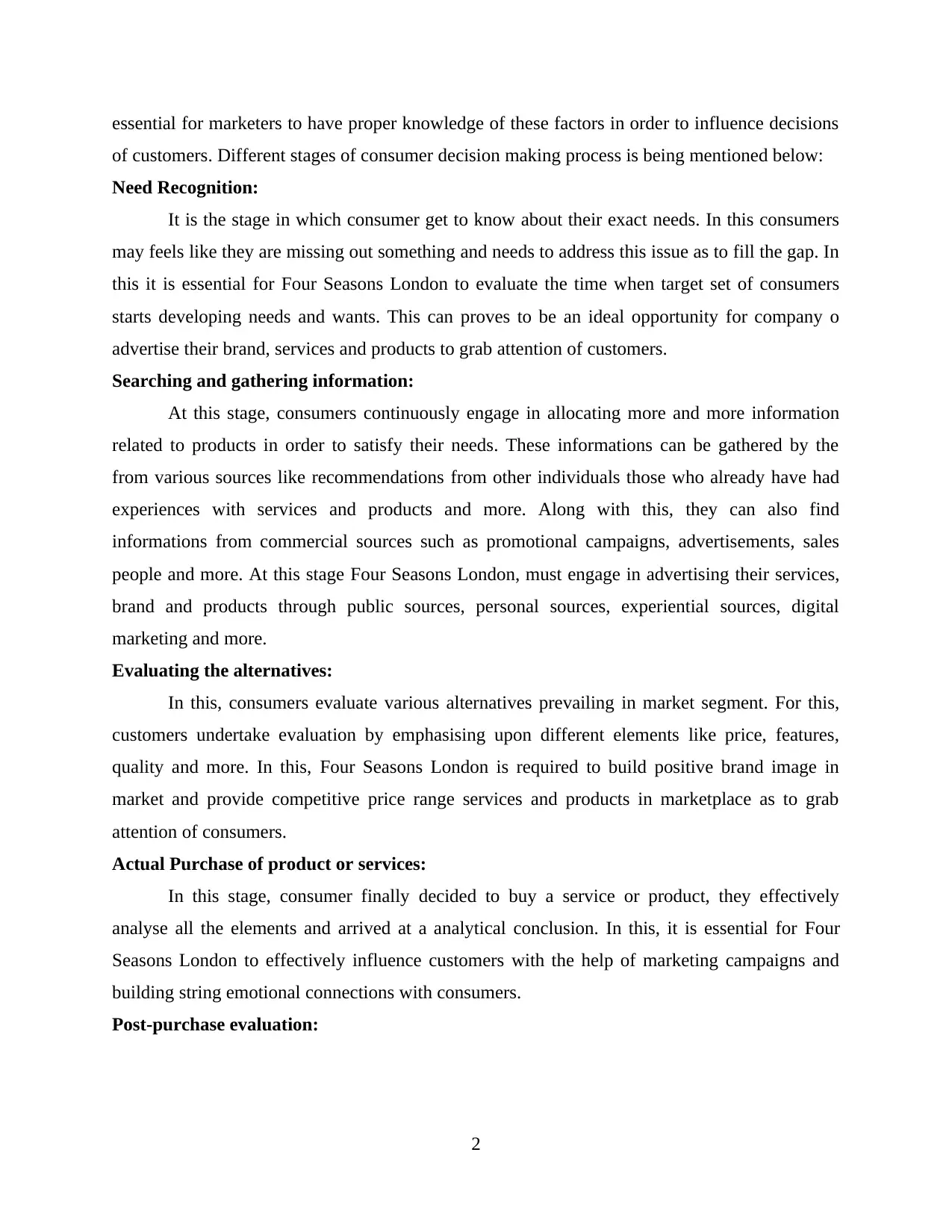
essential for marketers to have proper knowledge of these factors in order to influence decisions
of customers. Different stages of consumer decision making process is being mentioned below:
Need Recognition:
It is the stage in which consumer get to know about their exact needs. In this consumers
may feels like they are missing out something and needs to address this issue as to fill the gap. In
this it is essential for Four Seasons London to evaluate the time when target set of consumers
starts developing needs and wants. This can proves to be an ideal opportunity for company o
advertise their brand, services and products to grab attention of customers.
Searching and gathering information:
At this stage, consumers continuously engage in allocating more and more information
related to products in order to satisfy their needs. These informations can be gathered by the
from various sources like recommendations from other individuals those who already have had
experiences with services and products and more. Along with this, they can also find
informations from commercial sources such as promotional campaigns, advertisements, sales
people and more. At this stage Four Seasons London, must engage in advertising their services,
brand and products through public sources, personal sources, experiential sources, digital
marketing and more.
Evaluating the alternatives:
In this, consumers evaluate various alternatives prevailing in market segment. For this,
customers undertake evaluation by emphasising upon different elements like price, features,
quality and more. In this, Four Seasons London is required to build positive brand image in
market and provide competitive price range services and products in marketplace as to grab
attention of consumers.
Actual Purchase of product or services:
In this stage, consumer finally decided to buy a service or product, they effectively
analyse all the elements and arrived at a analytical conclusion. In this, it is essential for Four
Seasons London to effectively influence customers with the help of marketing campaigns and
building string emotional connections with consumers.
Post-purchase evaluation:
2
of customers. Different stages of consumer decision making process is being mentioned below:
Need Recognition:
It is the stage in which consumer get to know about their exact needs. In this consumers
may feels like they are missing out something and needs to address this issue as to fill the gap. In
this it is essential for Four Seasons London to evaluate the time when target set of consumers
starts developing needs and wants. This can proves to be an ideal opportunity for company o
advertise their brand, services and products to grab attention of customers.
Searching and gathering information:
At this stage, consumers continuously engage in allocating more and more information
related to products in order to satisfy their needs. These informations can be gathered by the
from various sources like recommendations from other individuals those who already have had
experiences with services and products and more. Along with this, they can also find
informations from commercial sources such as promotional campaigns, advertisements, sales
people and more. At this stage Four Seasons London, must engage in advertising their services,
brand and products through public sources, personal sources, experiential sources, digital
marketing and more.
Evaluating the alternatives:
In this, consumers evaluate various alternatives prevailing in market segment. For this,
customers undertake evaluation by emphasising upon different elements like price, features,
quality and more. In this, Four Seasons London is required to build positive brand image in
market and provide competitive price range services and products in marketplace as to grab
attention of consumers.
Actual Purchase of product or services:
In this stage, consumer finally decided to buy a service or product, they effectively
analyse all the elements and arrived at a analytical conclusion. In this, it is essential for Four
Seasons London to effectively influence customers with the help of marketing campaigns and
building string emotional connections with consumers.
Post-purchase evaluation:
2
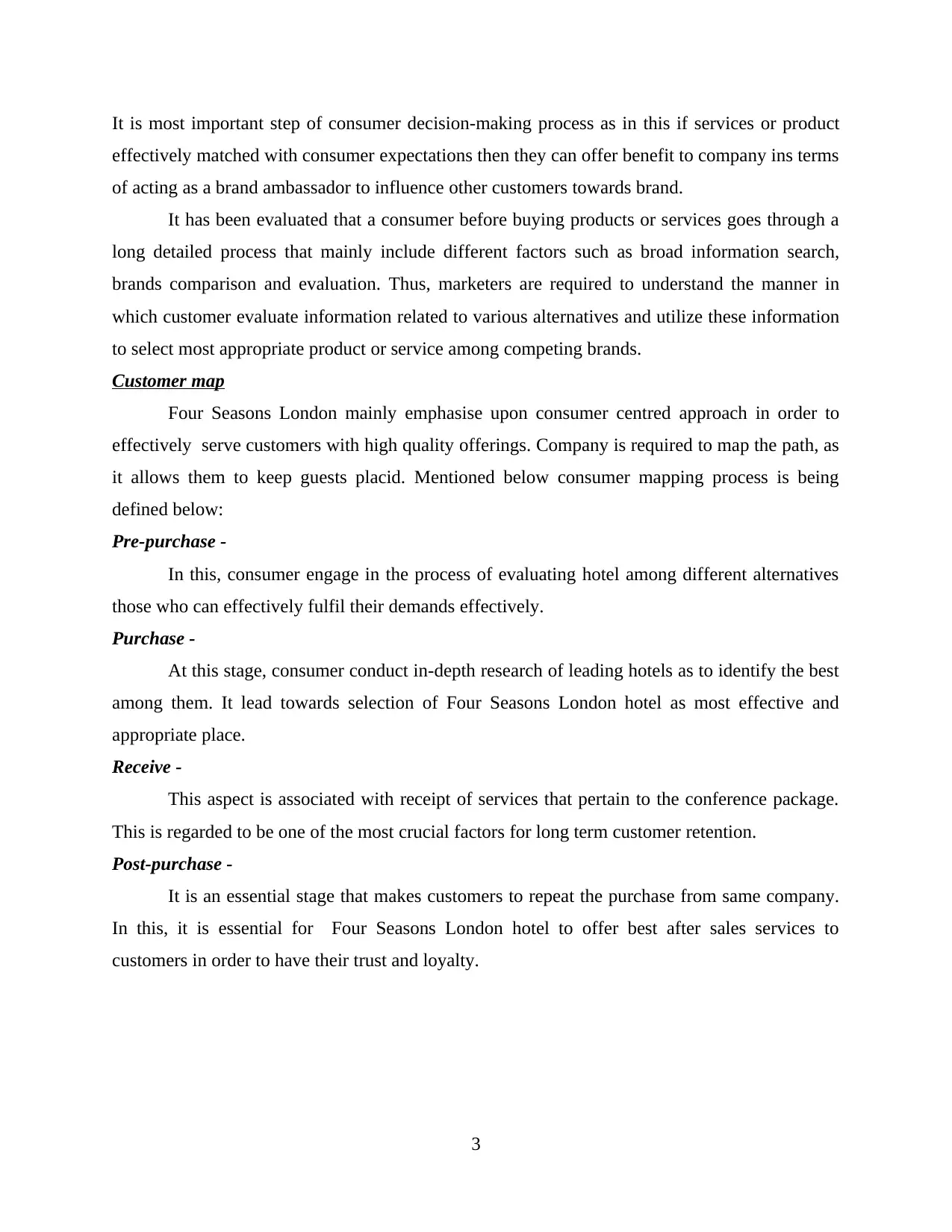
It is most important step of consumer decision-making process as in this if services or product
effectively matched with consumer expectations then they can offer benefit to company ins terms
of acting as a brand ambassador to influence other customers towards brand.
It has been evaluated that a consumer before buying products or services goes through a
long detailed process that mainly include different factors such as broad information search,
brands comparison and evaluation. Thus, marketers are required to understand the manner in
which customer evaluate information related to various alternatives and utilize these information
to select most appropriate product or service among competing brands.
Customer map
Four Seasons London mainly emphasise upon consumer centred approach in order to
effectively serve customers with high quality offerings. Company is required to map the path, as
it allows them to keep guests placid. Mentioned below consumer mapping process is being
defined below:
Pre-purchase -
In this, consumer engage in the process of evaluating hotel among different alternatives
those who can effectively fulfil their demands effectively.
Purchase -
At this stage, consumer conduct in-depth research of leading hotels as to identify the best
among them. It lead towards selection of Four Seasons London hotel as most effective and
appropriate place.
Receive -
This aspect is associated with receipt of services that pertain to the conference package.
This is regarded to be one of the most crucial factors for long term customer retention.
Post-purchase -
It is an essential stage that makes customers to repeat the purchase from same company.
In this, it is essential for Four Seasons London hotel to offer best after sales services to
customers in order to have their trust and loyalty.
3
effectively matched with consumer expectations then they can offer benefit to company ins terms
of acting as a brand ambassador to influence other customers towards brand.
It has been evaluated that a consumer before buying products or services goes through a
long detailed process that mainly include different factors such as broad information search,
brands comparison and evaluation. Thus, marketers are required to understand the manner in
which customer evaluate information related to various alternatives and utilize these information
to select most appropriate product or service among competing brands.
Customer map
Four Seasons London mainly emphasise upon consumer centred approach in order to
effectively serve customers with high quality offerings. Company is required to map the path, as
it allows them to keep guests placid. Mentioned below consumer mapping process is being
defined below:
Pre-purchase -
In this, consumer engage in the process of evaluating hotel among different alternatives
those who can effectively fulfil their demands effectively.
Purchase -
At this stage, consumer conduct in-depth research of leading hotels as to identify the best
among them. It lead towards selection of Four Seasons London hotel as most effective and
appropriate place.
Receive -
This aspect is associated with receipt of services that pertain to the conference package.
This is regarded to be one of the most crucial factors for long term customer retention.
Post-purchase -
It is an essential stage that makes customers to repeat the purchase from same company.
In this, it is essential for Four Seasons London hotel to offer best after sales services to
customers in order to have their trust and loyalty.
3
⊘ This is a preview!⊘
Do you want full access?
Subscribe today to unlock all pages.

Trusted by 1+ million students worldwide
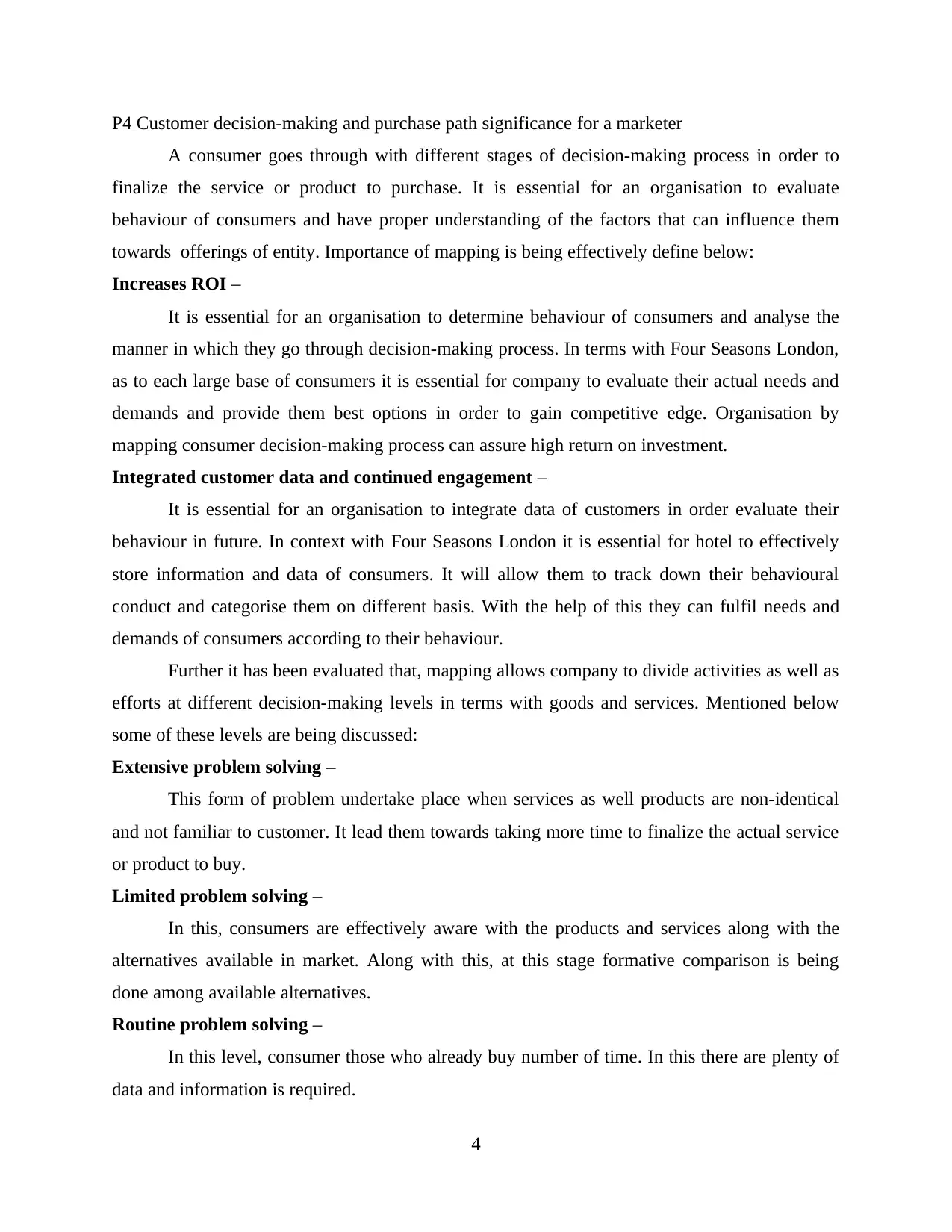
P4 Customer decision-making and purchase path significance for a marketer
A consumer goes through with different stages of decision-making process in order to
finalize the service or product to purchase. It is essential for an organisation to evaluate
behaviour of consumers and have proper understanding of the factors that can influence them
towards offerings of entity. Importance of mapping is being effectively define below:
Increases ROI –
It is essential for an organisation to determine behaviour of consumers and analyse the
manner in which they go through decision-making process. In terms with Four Seasons London,
as to each large base of consumers it is essential for company to evaluate their actual needs and
demands and provide them best options in order to gain competitive edge. Organisation by
mapping consumer decision-making process can assure high return on investment.
Integrated customer data and continued engagement –
It is essential for an organisation to integrate data of customers in order evaluate their
behaviour in future. In context with Four Seasons London it is essential for hotel to effectively
store information and data of consumers. It will allow them to track down their behavioural
conduct and categorise them on different basis. With the help of this they can fulfil needs and
demands of consumers according to their behaviour.
Further it has been evaluated that, mapping allows company to divide activities as well as
efforts at different decision-making levels in terms with goods and services. Mentioned below
some of these levels are being discussed:
Extensive problem solving –
This form of problem undertake place when services as well products are non-identical
and not familiar to customer. It lead them towards taking more time to finalize the actual service
or product to buy.
Limited problem solving –
In this, consumers are effectively aware with the products and services along with the
alternatives available in market. Along with this, at this stage formative comparison is being
done among available alternatives.
Routine problem solving –
In this level, consumer those who already buy number of time. In this there are plenty of
data and information is required.
4
A consumer goes through with different stages of decision-making process in order to
finalize the service or product to purchase. It is essential for an organisation to evaluate
behaviour of consumers and have proper understanding of the factors that can influence them
towards offerings of entity. Importance of mapping is being effectively define below:
Increases ROI –
It is essential for an organisation to determine behaviour of consumers and analyse the
manner in which they go through decision-making process. In terms with Four Seasons London,
as to each large base of consumers it is essential for company to evaluate their actual needs and
demands and provide them best options in order to gain competitive edge. Organisation by
mapping consumer decision-making process can assure high return on investment.
Integrated customer data and continued engagement –
It is essential for an organisation to integrate data of customers in order evaluate their
behaviour in future. In context with Four Seasons London it is essential for hotel to effectively
store information and data of consumers. It will allow them to track down their behavioural
conduct and categorise them on different basis. With the help of this they can fulfil needs and
demands of consumers according to their behaviour.
Further it has been evaluated that, mapping allows company to divide activities as well as
efforts at different decision-making levels in terms with goods and services. Mentioned below
some of these levels are being discussed:
Extensive problem solving –
This form of problem undertake place when services as well products are non-identical
and not familiar to customer. It lead them towards taking more time to finalize the actual service
or product to buy.
Limited problem solving –
In this, consumers are effectively aware with the products and services along with the
alternatives available in market. Along with this, at this stage formative comparison is being
done among available alternatives.
Routine problem solving –
In this level, consumer those who already buy number of time. In this there are plenty of
data and information is required.
4
Paraphrase This Document
Need a fresh take? Get an instant paraphrase of this document with our AI Paraphraser
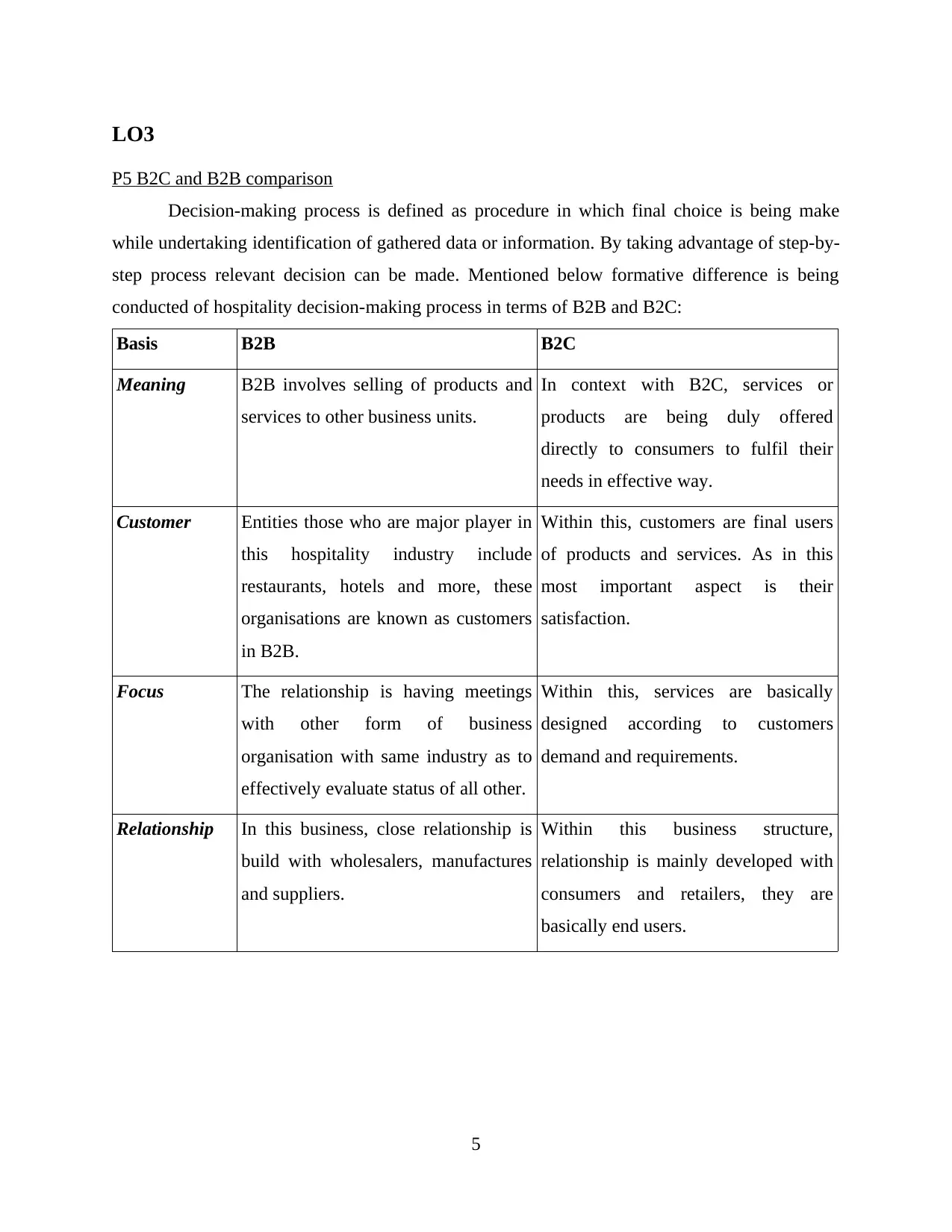
LO3
P5 B2C and B2B comparison
Decision-making process is defined as procedure in which final choice is being make
while undertaking identification of gathered data or information. By taking advantage of step-by-
step process relevant decision can be made. Mentioned below formative difference is being
conducted of hospitality decision-making process in terms of B2B and B2C:
Basis B2B B2C
Meaning B2B involves selling of products and
services to other business units.
In context with B2C, services or
products are being duly offered
directly to consumers to fulfil their
needs in effective way.
Customer Entities those who are major player in
this hospitality industry include
restaurants, hotels and more, these
organisations are known as customers
in B2B.
Within this, customers are final users
of products and services. As in this
most important aspect is their
satisfaction.
Focus The relationship is having meetings
with other form of business
organisation with same industry as to
effectively evaluate status of all other.
Within this, services are basically
designed according to customers
demand and requirements.
Relationship In this business, close relationship is
build with wholesalers, manufactures
and suppliers.
Within this business structure,
relationship is mainly developed with
consumers and retailers, they are
basically end users.
5
P5 B2C and B2B comparison
Decision-making process is defined as procedure in which final choice is being make
while undertaking identification of gathered data or information. By taking advantage of step-by-
step process relevant decision can be made. Mentioned below formative difference is being
conducted of hospitality decision-making process in terms of B2B and B2C:
Basis B2B B2C
Meaning B2B involves selling of products and
services to other business units.
In context with B2C, services or
products are being duly offered
directly to consumers to fulfil their
needs in effective way.
Customer Entities those who are major player in
this hospitality industry include
restaurants, hotels and more, these
organisations are known as customers
in B2B.
Within this, customers are final users
of products and services. As in this
most important aspect is their
satisfaction.
Focus The relationship is having meetings
with other form of business
organisation with same industry as to
effectively evaluate status of all other.
Within this, services are basically
designed according to customers
demand and requirements.
Relationship In this business, close relationship is
build with wholesalers, manufactures
and suppliers.
Within this business structure,
relationship is mainly developed with
consumers and retailers, they are
basically end users.
5
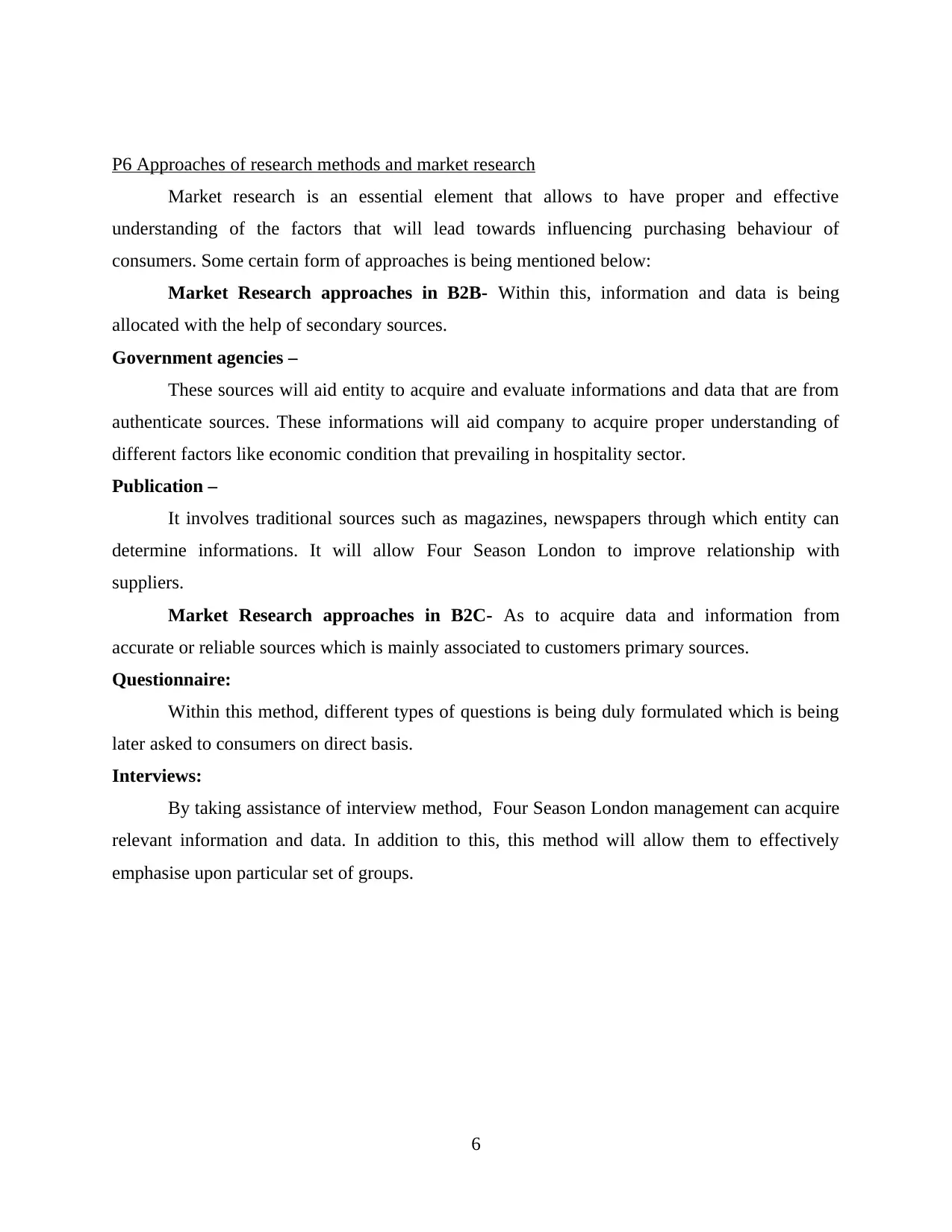
P6 Approaches of research methods and market research
Market research is an essential element that allows to have proper and effective
understanding of the factors that will lead towards influencing purchasing behaviour of
consumers. Some certain form of approaches is being mentioned below:
Market Research approaches in B2B- Within this, information and data is being
allocated with the help of secondary sources.
Government agencies –
These sources will aid entity to acquire and evaluate informations and data that are from
authenticate sources. These informations will aid company to acquire proper understanding of
different factors like economic condition that prevailing in hospitality sector.
Publication –
It involves traditional sources such as magazines, newspapers through which entity can
determine informations. It will allow Four Season London to improve relationship with
suppliers.
Market Research approaches in B2C- As to acquire data and information from
accurate or reliable sources which is mainly associated to customers primary sources.
Questionnaire:
Within this method, different types of questions is being duly formulated which is being
later asked to consumers on direct basis.
Interviews:
By taking assistance of interview method, Four Season London management can acquire
relevant information and data. In addition to this, this method will allow them to effectively
emphasise upon particular set of groups.
6
Market research is an essential element that allows to have proper and effective
understanding of the factors that will lead towards influencing purchasing behaviour of
consumers. Some certain form of approaches is being mentioned below:
Market Research approaches in B2B- Within this, information and data is being
allocated with the help of secondary sources.
Government agencies –
These sources will aid entity to acquire and evaluate informations and data that are from
authenticate sources. These informations will aid company to acquire proper understanding of
different factors like economic condition that prevailing in hospitality sector.
Publication –
It involves traditional sources such as magazines, newspapers through which entity can
determine informations. It will allow Four Season London to improve relationship with
suppliers.
Market Research approaches in B2C- As to acquire data and information from
accurate or reliable sources which is mainly associated to customers primary sources.
Questionnaire:
Within this method, different types of questions is being duly formulated which is being
later asked to consumers on direct basis.
Interviews:
By taking assistance of interview method, Four Season London management can acquire
relevant information and data. In addition to this, this method will allow them to effectively
emphasise upon particular set of groups.
6
⊘ This is a preview!⊘
Do you want full access?
Subscribe today to unlock all pages.

Trusted by 1+ million students worldwide
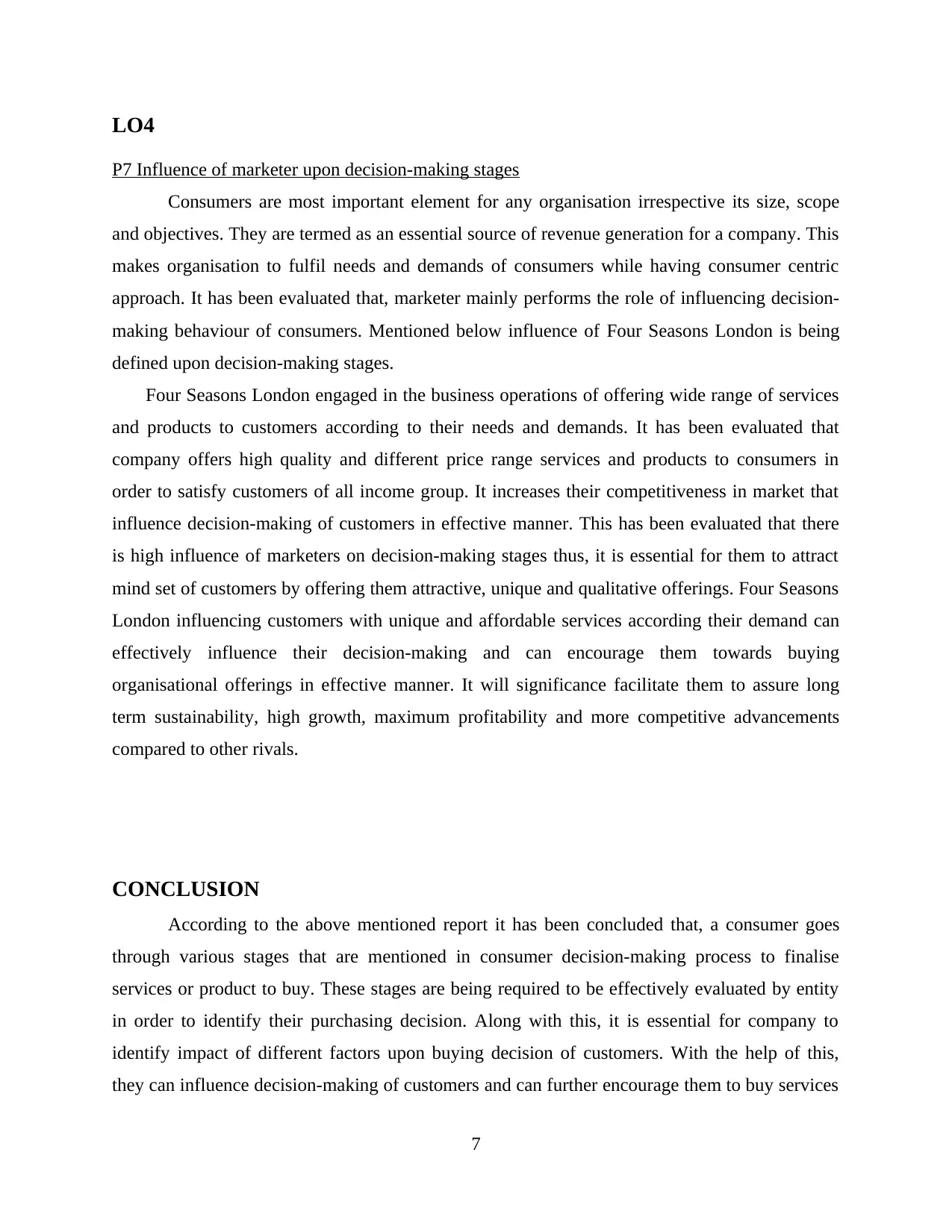
LO4
P7 Influence of marketer upon decision-making stages
Consumers are most important element for any organisation irrespective its size, scope
and objectives. They are termed as an essential source of revenue generation for a company. This
makes organisation to fulfil needs and demands of consumers while having consumer centric
approach. It has been evaluated that, marketer mainly performs the role of influencing decision-
making behaviour of consumers. Mentioned below influence of Four Seasons London is being
defined upon decision-making stages.
Four Seasons London engaged in the business operations of offering wide range of services
and products to customers according to their needs and demands. It has been evaluated that
company offers high quality and different price range services and products to consumers in
order to satisfy customers of all income group. It increases their competitiveness in market that
influence decision-making of customers in effective manner. This has been evaluated that there
is high influence of marketers on decision-making stages thus, it is essential for them to attract
mind set of customers by offering them attractive, unique and qualitative offerings. Four Seasons
London influencing customers with unique and affordable services according their demand can
effectively influence their decision-making and can encourage them towards buying
organisational offerings in effective manner. It will significance facilitate them to assure long
term sustainability, high growth, maximum profitability and more competitive advancements
compared to other rivals.
CONCLUSION
According to the above mentioned report it has been concluded that, a consumer goes
through various stages that are mentioned in consumer decision-making process to finalise
services or product to buy. These stages are being required to be effectively evaluated by entity
in order to identify their purchasing decision. Along with this, it is essential for company to
identify impact of different factors upon buying decision of customers. With the help of this,
they can influence decision-making of customers and can further encourage them to buy services
7
P7 Influence of marketer upon decision-making stages
Consumers are most important element for any organisation irrespective its size, scope
and objectives. They are termed as an essential source of revenue generation for a company. This
makes organisation to fulfil needs and demands of consumers while having consumer centric
approach. It has been evaluated that, marketer mainly performs the role of influencing decision-
making behaviour of consumers. Mentioned below influence of Four Seasons London is being
defined upon decision-making stages.
Four Seasons London engaged in the business operations of offering wide range of services
and products to customers according to their needs and demands. It has been evaluated that
company offers high quality and different price range services and products to consumers in
order to satisfy customers of all income group. It increases their competitiveness in market that
influence decision-making of customers in effective manner. This has been evaluated that there
is high influence of marketers on decision-making stages thus, it is essential for them to attract
mind set of customers by offering them attractive, unique and qualitative offerings. Four Seasons
London influencing customers with unique and affordable services according their demand can
effectively influence their decision-making and can encourage them towards buying
organisational offerings in effective manner. It will significance facilitate them to assure long
term sustainability, high growth, maximum profitability and more competitive advancements
compared to other rivals.
CONCLUSION
According to the above mentioned report it has been concluded that, a consumer goes
through various stages that are mentioned in consumer decision-making process to finalise
services or product to buy. These stages are being required to be effectively evaluated by entity
in order to identify their purchasing decision. Along with this, it is essential for company to
identify impact of different factors upon buying decision of customers. With the help of this,
they can influence decision-making of customers and can further encourage them to buy services
7
Paraphrase This Document
Need a fresh take? Get an instant paraphrase of this document with our AI Paraphraser
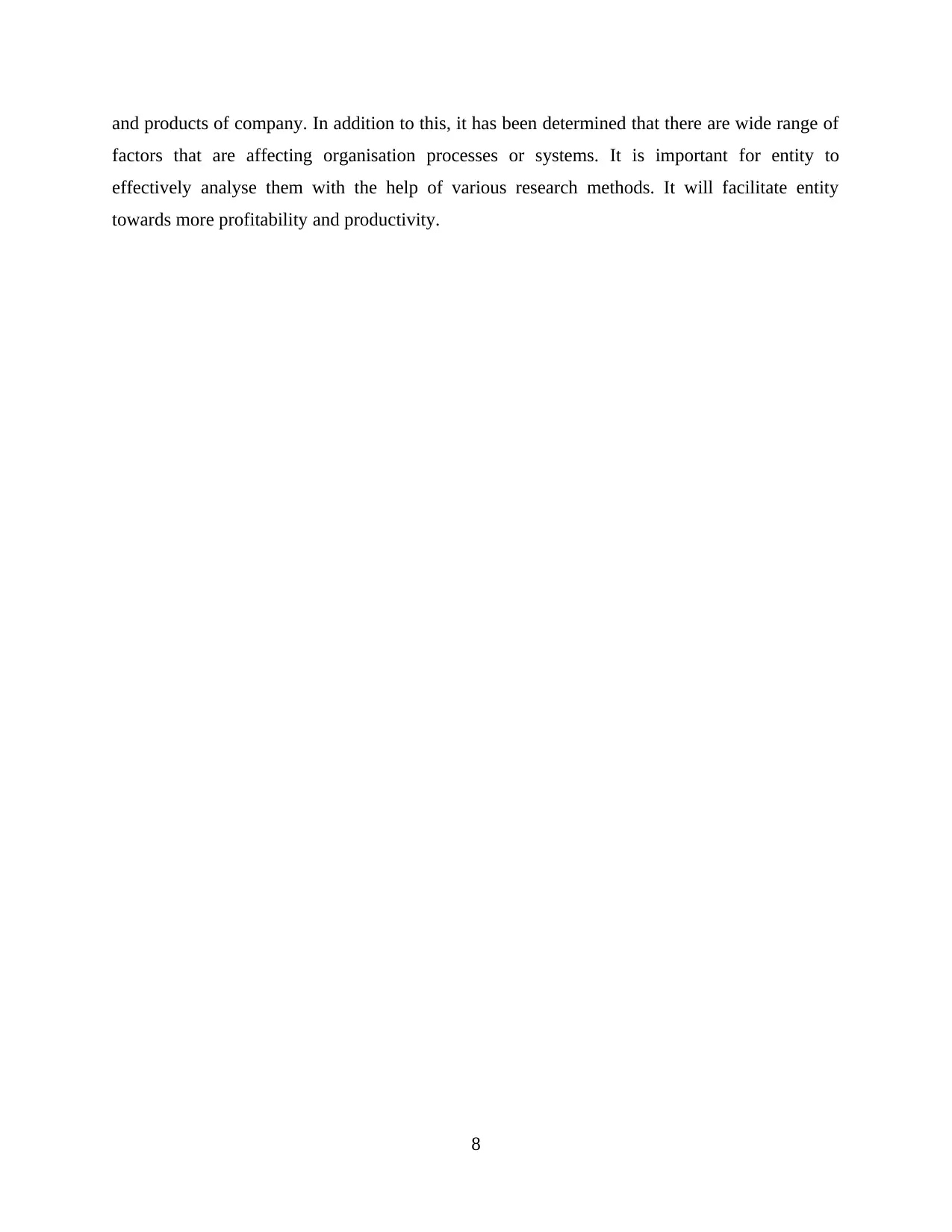
and products of company. In addition to this, it has been determined that there are wide range of
factors that are affecting organisation processes or systems. It is important for entity to
effectively analyse them with the help of various research methods. It will facilitate entity
towards more profitability and productivity.
8
factors that are affecting organisation processes or systems. It is important for entity to
effectively analyse them with the help of various research methods. It will facilitate entity
towards more profitability and productivity.
8
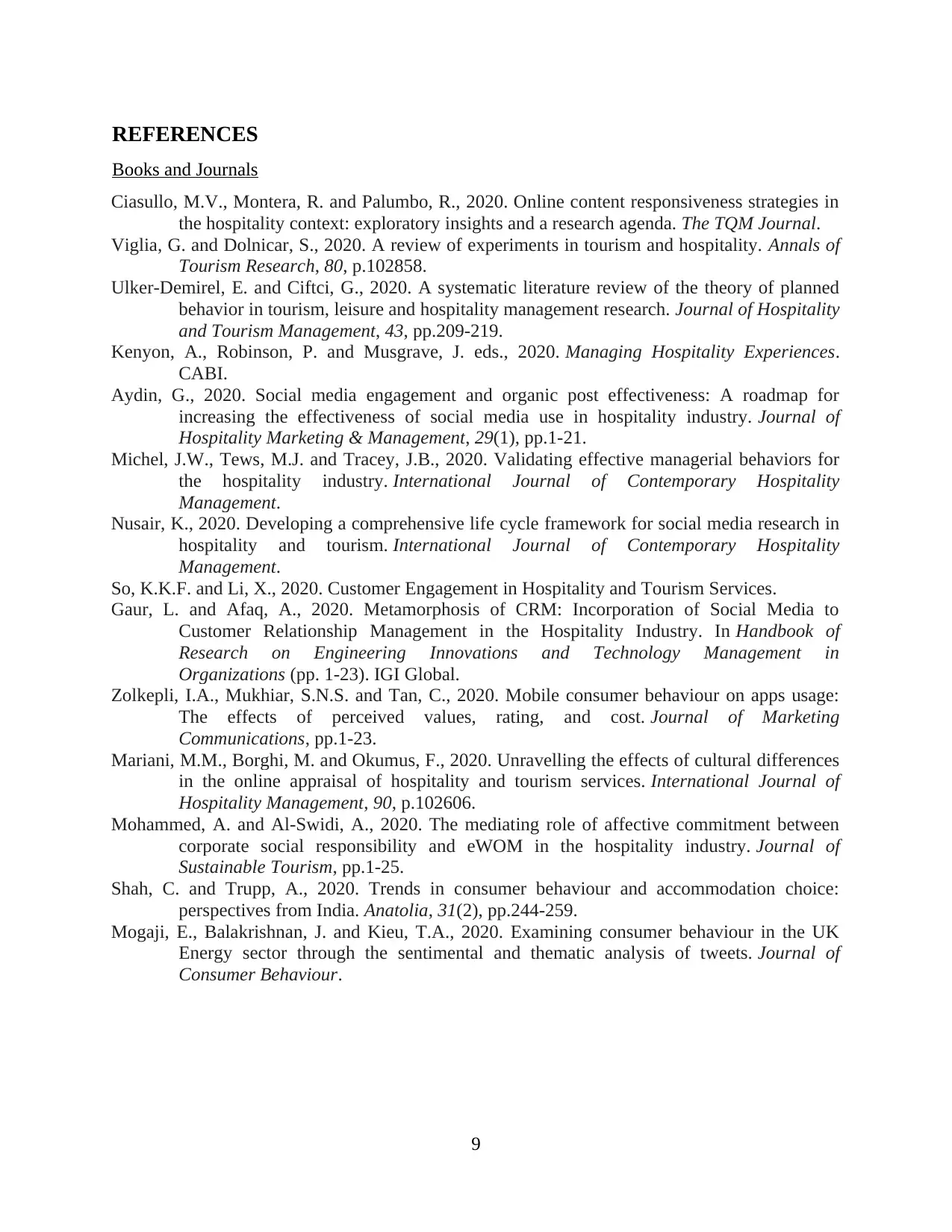
REFERENCES
Books and Journals
Ciasullo, M.V., Montera, R. and Palumbo, R., 2020. Online content responsiveness strategies in
the hospitality context: exploratory insights and a research agenda. The TQM Journal.
Viglia, G. and Dolnicar, S., 2020. A review of experiments in tourism and hospitality. Annals of
Tourism Research, 80, p.102858.
Ulker-Demirel, E. and Ciftci, G., 2020. A systematic literature review of the theory of planned
behavior in tourism, leisure and hospitality management research. Journal of Hospitality
and Tourism Management, 43, pp.209-219.
Kenyon, A., Robinson, P. and Musgrave, J. eds., 2020. Managing Hospitality Experiences.
CABI.
Aydin, G., 2020. Social media engagement and organic post effectiveness: A roadmap for
increasing the effectiveness of social media use in hospitality industry. Journal of
Hospitality Marketing & Management, 29(1), pp.1-21.
Michel, J.W., Tews, M.J. and Tracey, J.B., 2020. Validating effective managerial behaviors for
the hospitality industry. International Journal of Contemporary Hospitality
Management.
Nusair, K., 2020. Developing a comprehensive life cycle framework for social media research in
hospitality and tourism. International Journal of Contemporary Hospitality
Management.
So, K.K.F. and Li, X., 2020. Customer Engagement in Hospitality and Tourism Services.
Gaur, L. and Afaq, A., 2020. Metamorphosis of CRM: Incorporation of Social Media to
Customer Relationship Management in the Hospitality Industry. In Handbook of
Research on Engineering Innovations and Technology Management in
Organizations (pp. 1-23). IGI Global.
Zolkepli, I.A., Mukhiar, S.N.S. and Tan, C., 2020. Mobile consumer behaviour on apps usage:
The effects of perceived values, rating, and cost. Journal of Marketing
Communications, pp.1-23.
Mariani, M.M., Borghi, M. and Okumus, F., 2020. Unravelling the effects of cultural differences
in the online appraisal of hospitality and tourism services. International Journal of
Hospitality Management, 90, p.102606.
Mohammed, A. and Al-Swidi, A., 2020. The mediating role of affective commitment between
corporate social responsibility and eWOM in the hospitality industry. Journal of
Sustainable Tourism, pp.1-25.
Shah, C. and Trupp, A., 2020. Trends in consumer behaviour and accommodation choice:
perspectives from India. Anatolia, 31(2), pp.244-259.
Mogaji, E., Balakrishnan, J. and Kieu, T.A., 2020. Examining consumer behaviour in the UK
Energy sector through the sentimental and thematic analysis of tweets. Journal of
Consumer Behaviour.
9
Books and Journals
Ciasullo, M.V., Montera, R. and Palumbo, R., 2020. Online content responsiveness strategies in
the hospitality context: exploratory insights and a research agenda. The TQM Journal.
Viglia, G. and Dolnicar, S., 2020. A review of experiments in tourism and hospitality. Annals of
Tourism Research, 80, p.102858.
Ulker-Demirel, E. and Ciftci, G., 2020. A systematic literature review of the theory of planned
behavior in tourism, leisure and hospitality management research. Journal of Hospitality
and Tourism Management, 43, pp.209-219.
Kenyon, A., Robinson, P. and Musgrave, J. eds., 2020. Managing Hospitality Experiences.
CABI.
Aydin, G., 2020. Social media engagement and organic post effectiveness: A roadmap for
increasing the effectiveness of social media use in hospitality industry. Journal of
Hospitality Marketing & Management, 29(1), pp.1-21.
Michel, J.W., Tews, M.J. and Tracey, J.B., 2020. Validating effective managerial behaviors for
the hospitality industry. International Journal of Contemporary Hospitality
Management.
Nusair, K., 2020. Developing a comprehensive life cycle framework for social media research in
hospitality and tourism. International Journal of Contemporary Hospitality
Management.
So, K.K.F. and Li, X., 2020. Customer Engagement in Hospitality and Tourism Services.
Gaur, L. and Afaq, A., 2020. Metamorphosis of CRM: Incorporation of Social Media to
Customer Relationship Management in the Hospitality Industry. In Handbook of
Research on Engineering Innovations and Technology Management in
Organizations (pp. 1-23). IGI Global.
Zolkepli, I.A., Mukhiar, S.N.S. and Tan, C., 2020. Mobile consumer behaviour on apps usage:
The effects of perceived values, rating, and cost. Journal of Marketing
Communications, pp.1-23.
Mariani, M.M., Borghi, M. and Okumus, F., 2020. Unravelling the effects of cultural differences
in the online appraisal of hospitality and tourism services. International Journal of
Hospitality Management, 90, p.102606.
Mohammed, A. and Al-Swidi, A., 2020. The mediating role of affective commitment between
corporate social responsibility and eWOM in the hospitality industry. Journal of
Sustainable Tourism, pp.1-25.
Shah, C. and Trupp, A., 2020. Trends in consumer behaviour and accommodation choice:
perspectives from India. Anatolia, 31(2), pp.244-259.
Mogaji, E., Balakrishnan, J. and Kieu, T.A., 2020. Examining consumer behaviour in the UK
Energy sector through the sentimental and thematic analysis of tweets. Journal of
Consumer Behaviour.
9
⊘ This is a preview!⊘
Do you want full access?
Subscribe today to unlock all pages.

Trusted by 1+ million students worldwide
1 out of 13
Related Documents
Your All-in-One AI-Powered Toolkit for Academic Success.
+13062052269
info@desklib.com
Available 24*7 on WhatsApp / Email
![[object Object]](/_next/static/media/star-bottom.7253800d.svg)
Unlock your academic potential
Copyright © 2020–2026 A2Z Services. All Rights Reserved. Developed and managed by ZUCOL.




